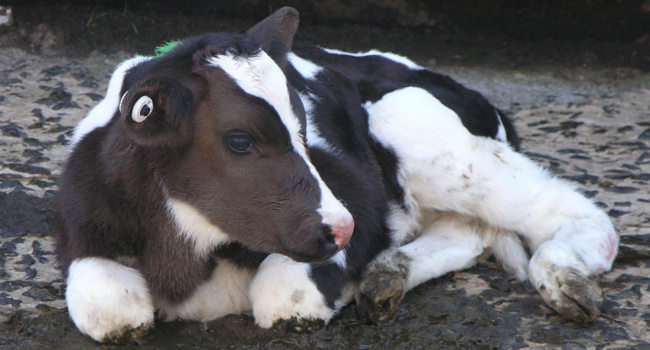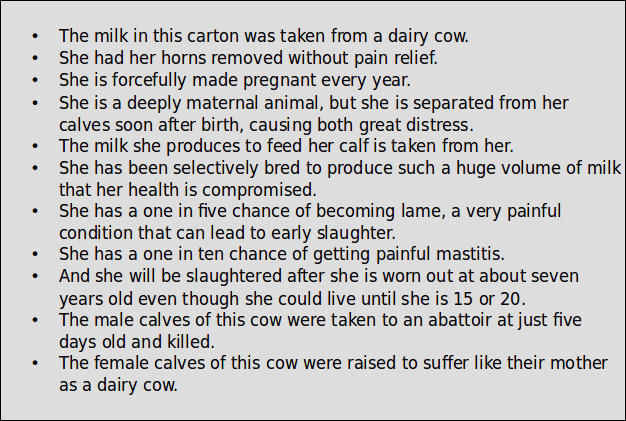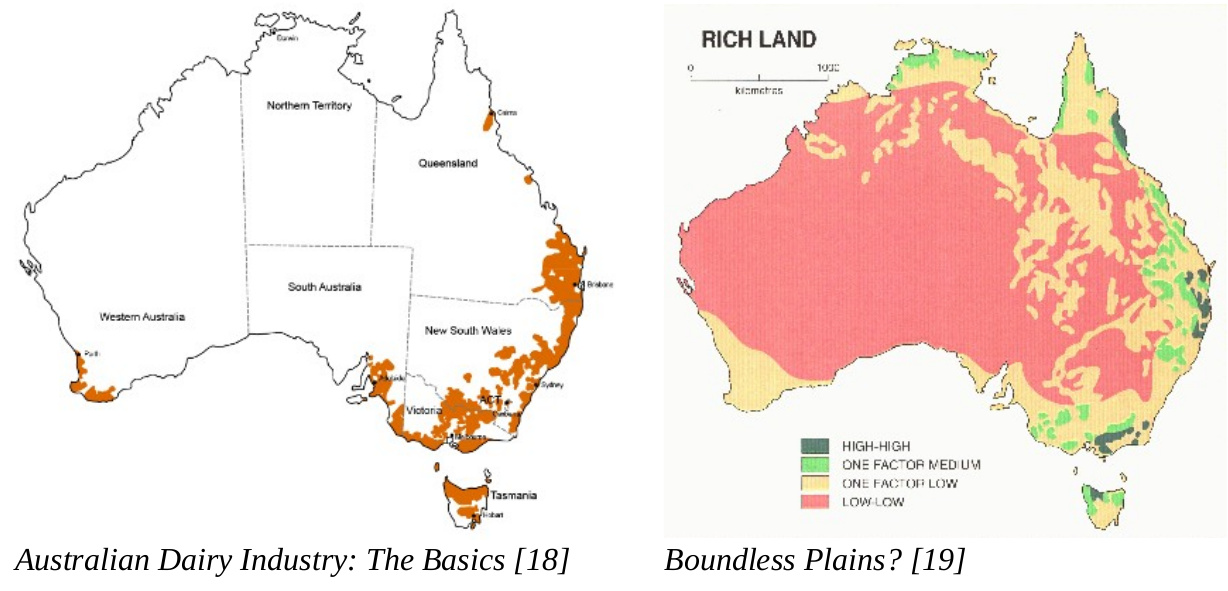
The Senate inquiry into the dairy industry, instructed to find "a fair, long term solution to Australia's dairy crisis", has been told that the only fair way for the animals is for the industry to be phased out.
In its submission to the Senate Economics References Committee's inquiry into the Australian dairy industry, Vegan Australia said that "While the focus of this inquiry is on the economic wellbeing and health of dairy farmers, it also provides the opportunity to reflect on the intrinsic suffering of animals in the dairy industry."
The submission suggests other ways for dairy farmers to use their land. "This phase out can be an opportunity for farmers currently in the dairy industry to shift into growing plant foods. Currently, dairy farms occupy some of the most fertile land in Australia."
"One potentially profitable avenue is the growth of plants for the alternative milk, and other alternative dairy, markets. This sector has seen strong annual growth of 6% in Australia for the past five years while, over the same period, the consumption of dairy milk has plateaued. In the United States, the contrast has been starker in the last year, with a 7% drop in dairy consumption corresponding with a 9% rise in the consumption of alternative milk products . Some entrepreneurial Australian farmers have turned to high profit alternatives, like macadamias, to fuel the growing demand both nationally and internationally, while others await the legalisation of hemp foods, hoping to corner a newly legal market."
The media has covered our submission in the article Animal rights groups demand 10-year dairy industry phase-out in The Land.
Read the full submission below.
Vegan Australia welcomes the opportunity to make this submission to the Senate Economics References Committee's inquiry into the Australian dairy industry. We hope this submission assists the committee in setting priorities for the future of the industry.
We note the terms of reference for the inquiry: "to establish a fair, long term solution to Australia's dairy crisis, with particular reference to fresh milk security and:
a. the legality of retrospective elements of milk contracts
b. the behaviour of Murray Goulburn; and
c. any other related matters."
Vegan Australia is a national organisation that informs the public about animal rights and veganism and also presents a strong voice for veganism to government, institutions, corporations and the media. Vegan Australia envisions a world where all animals live free from human use and ownership. The foundation of Vegan Australia is justice and compassion, for animals as well as for people and the planet. The first step each of us should take to put this compassion into action is to become vegan and to encourage others to do the same. Veganism is a rejection of the exploitation involved in commodifying and using sentient beings.
While the focus of this inquiry is on the economic wellbeing and health of dairy farmers, it also provides the opportunity to reflect on the intrinsic suffering of animals in the dairy industry. While the industry enjoys significant support from the community, this largely stems from the community's ignorance of standard practice on dairy farms.
In this submission, Vegan Australia will demonstrate that the very existence of the dairy industry in Australia perpetuates unfairness and injustice to animals. A ten year phase out of the dairy industry will be proposed, in agreement with our policy to phase out all animal agriculture over the same period. Doing so will not only be of benefit the animals in the dairy industry, it will also provide the opportunity to future-proof Australia's agricultural sector and benefit individual farmers.
It is the position of Vegan Australia that any animal exploitation, including the exploitation occurring in the dairy industry, is inherently unfair. In order to establish a fair, long term solution to Australia's dairy crisis, it is critical to examine the impacts of the dairy industry not only upon humans, but also on the cows and calves used by the industry.
Cows are social animals that form close personal relationships with other cows. When they are paired with their friends they are less agitated and have a lower heart rate than when they are paired with a random individual[1]. When separated from their friends for an extended period of time, they show significant behavioural and psychological changes[1]. Cows, and calves, not only form friendships with others, they have also been observed to develop a dislike for other individuals and bear grudges[2]. Cows also display great inquisitiveness for their surroundings[2], and display emotional reactions upon having solved problems[3].
Vegan Australia, in partnership with Little Oak Sanctuary, would like to extend an invitation to members of the Senate Economic References Committee to visit first-hand some of the animals that have been impacted by the Australian dairy industry. By hearing the stories of the three 'bobby calves' that live on the sanctuary, and experiencing their nature, members of the committee can better understand the reality of the dairy industry. Please contact Vegan Australia to arrange a visit.
Many standard practices of the dairy industry would be perceived as abhorrent to the general population if they were widely known about:
For a more complete picture of the impact of the dairy industry on animals in Australia, it is recommended that members of the committee read "The Life of the Dairy Cow" prepared by Voiceless, the animal protection institute[15].
While Vegan Australia believes that the dairy industry should ultimately be phased out in Australia, in the intervening period, the public has both a right and a responsibility to understand the realities of production of dairy products they consume. To this end, mandatory labelling of all dairy products sold in Australia should be introduced to educate the public on the effect of the dairy industry on animals. Such a label should include the significant relevant types of suffering endured by the animals, to allow consumers to make an informed choice. An example of information that should be provided is:

Vegan Australia is very aware that agriculture is a fundamental part of society and wants to see the continued prosperity of farming and farmers. We believe this can be done without the use and exploitation of animals. The long term solution to the dairy crisis is to phase out dairy.
While the dairy industry may seem like a permanent fixture of the Australian landscape, it is only a matter of time before technology results in superior alternatives that are far more efficient. One promising example is the US startup, Perfect Day, that is using a specialised strain of yeast to brew the proteins (casein and whey) found in dairy milk[16]. While this technology is still in its infancy, it is expected to rapidly mature over the coming years. This will happen concurrently with advancements in technology used to produce plant-based dairy alternatives which will create better tasting products that are price competitive with dairy with reduced health, environmental and animal suffering concerns. While consumers in Australia may hold out some loyalty to the dairy industry, consumers in other countries, particularly China (our largest export market[17]) are unlikely to show the same loyalty. Chinese policy will shift to domestic production using advanced technology as soon as that technology becomes more cost efficient than importing Australian milk. A gradual phase out of the dairy industry in Australia over the next ten years will minimise the impact of this inevitable shift.
This phase out can be an opportunity for farmers currently in the dairy industry to shift into growing plant foods. Currently, dairy farms occupy some of the most fertile land in Australia, as can be seen from the following two maps.

The dairy industry exists almost entirely on land that is suitable for plant-based agriculture. Thus, there is an opportunity cost to producing dairy. By using this land to produce dairy, the landowners are forgoing the possibility of producing plant foods, some of which could mean greater returns and stability than dairy. By producing dairy, Australia as a whole is producing a suboptimal amount of food, as plant foods tend to be much more efficient than dairy. Crucially, this means that dairy farmers can be encouraged to phase out dairy without requiring them to abandon their livelihood.
One potentially profitable avenue is the growth of plants for the alternative milk, and other alternative dairy, markets. This sector has seen strong annual growth of 6% in Australia for the past five years[20] while, over the same period, the consumption of dairy milk has plateaued[21]. In the United States, the contrast has been starker in the last year, with a 7% drop in dairy consumption corresponding with a 9% rise in the consumption of alternative milk products[22]. Some entrepreneurial Australian farmers have turned to high profit alternatives, like macadamias[23], to fuel the growing demand both nationally and internationally, while others await the legalisation of hemp foods, hoping to corner a newly legal market[24].
It is the position of Vegan Australia that a phase out of dairy in Australia, along with other animal industries, would result in significant benefits to Australia's environment, the health of our citizens, and the wellbeing of animals. Introducing this phase out over ten years, and providing government support in switching industries, would allow such a transition to be of net benefit to Australian farmers.
Vegan Australia hopes to see a strong agricultural sector in Australia, but the prosperity of this sector must not be reliant on the exploitation of animals. Cows are sensitive, intelligent creatures who deserve to be treated with fairness and respect; this is not the treatment they receive in the dairy industry. Vegan Australia understands that this review is primarily focussed on the fair treatment of Australian dairy farmers, but the aim of the review to "establish a fair, long term solution to Australia's dairy crisis" cannot be realised until the fairness to the non-human animals upon whom the industry is built is considered. It is the position of Vegan Australia that a fair dairy industry is impossible, as the products of the dairy industry cannot be separated from the inherent unfairness to the animals used by the industry.
To this end, Vegan Australia proposes a phase out of the dairy industry over ten years. To achieve this, government assistance should be given to current dairy farmers who wish to transition to plant-based agriculture. Such a move would allow Australia to produce more food, and potentially allow farmers to increase the profitability of their land. Dairy has had a strong past in Australia, but this nation could have a stronger future without it.
Tim Westcott
Vegan Australia
Photo: Bobby calf - Animals Australia

Unsubscribe at any time. Your details are safe, refer to our privacy policy.
© Vegan Australia | Registered as a non-profit charity by the ACNC | ABN 21 169 219 854